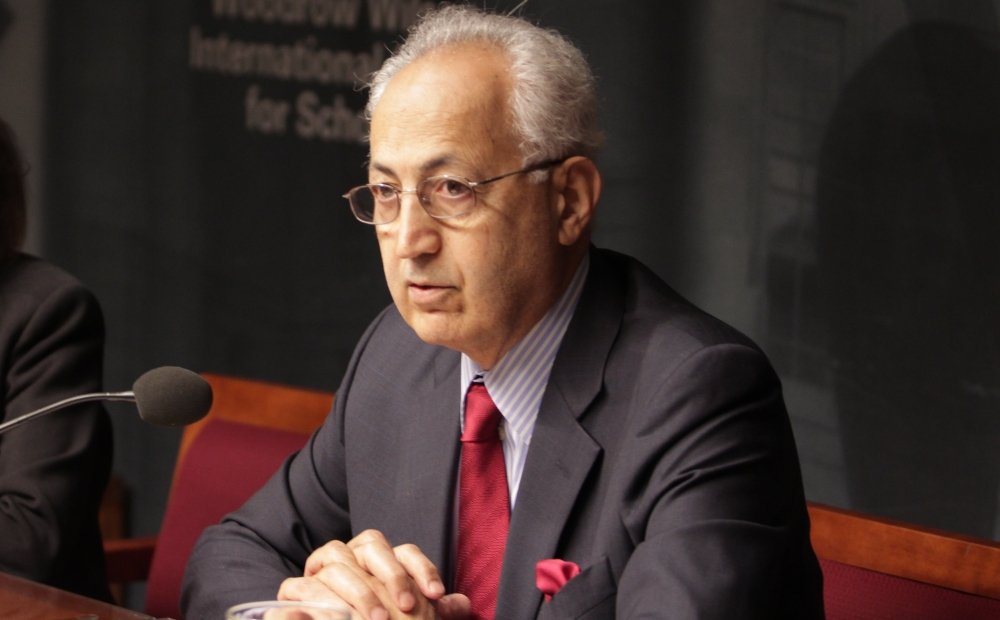Iraq: Now and After ISIS

Samir Sumaida’ie, Diplomat in Residence at the Woodrow Wilson Center and former Iraqi Ambassador to the United States and the United Nations, discussed Iraq’s history and expressed guarded optimism for the country’s future.
On April 2, 2015, the Middle East Program at the Woodrow Wilson Center hosted an event, “Iraq: Now and After ISIS” with Sumaida’ie. Haleh Esfandiari, Director of the Middle East Program, Woodrow Wilson Center, moderated the event.
Sumaida’ie began by recalling the period of time when the British helped establish the modern state of Iraq; the country thrived and made progress, with a productive economy and robust educational and health systems that were the envy of the region. He noted that the military coup of 1958 was the beginning of Iraq’s downturn on every front. It led to the dictatorship of Saddam Hussain which brought about wars and sanctions, the latter being as destructive as the former. He went on to say that when the United States entered Iraq in 2003 it greatly underestimated the degree of the country’s collapse. Sumaida’ie indicated that the collapsed state of the country and the mismanagement by the Americans paved the way to another poor leader, namely former Prime Minister Nouri al-Maliki to take over, thereby creating the conditions that allowed ISIS to sweep through the country.
Sumaida’ie explained that with the invasion of Iraq the United States wanted to create a democratic state in its image. However, while some Iraqi leaders were accepting of this idea, the country as a whole could not adapt as quickly to it. He then noted various factors that contributed to Iraq’s growing instability. Sumaida’ie highlighted the fact that Iraq is a rentier state where the government depends not on taxing people for revenue, and consequently seeking their approval via elections, but relies on the sale of oil for revenue. This encourages a mentality of “winner takes all” instead of a dedication to public service. Sumaida’ie then added that Islamist parties (and the Kurds) were the only organized political forces in the country at the time the Americans invaded, which led to sectarian politics and instability. Furthermore, Sumaida’ie pointed to outside influences. Iraq became the battleground in the confrontation between Iran and the United States, which placed it in the “epicenter of a geopolitical storm.” Neighboring countries all attempted to move Iraq in directions that would benefit them the most. He stated that Iran ended up as the country with the greatest influence in Iraq. This alarmed the Sunni communities and made relations between the central government and some parts of the country difficult.
In addition, Sumaida’ie argued that former Prime Minister Maliki alienated many people and established a culture of sectarianism, corruption, and violence in all parts of government. This led to the collapse of the Iraqi security forces when confronted by the onslaught of ISIS terrorists. He added that Syria’s sectarian tension flowed into Iraq and added to the deterioration of national security. Sumaida’ie said that the tension between Sunni and Shi’a populations is a relatively recent problem. He believes that if the current Prime Minister, Haider al-Abadi, capitalizes on the Iraqi people’s popular sentiment of frustration with corruption and works to rally people against ISIS, the country may be able to get back on its feet. He remains optimistic that Iraq will survive ISIS’s violence and corruption, but stated that it is also possible that the country will be driven into further chaos. Sumaida’ie ended by stating that many who represent Iraqi culture have left Iraq, and that the physical as well as cultural destruction of Iraq must end and the path to restoration must begin.
By: Mirette Wahba, Middle East Program
Hosted By

Middle East Program
The Wilson Center’s Middle East Program serves as a crucial resource for the policymaking community and beyond, providing analyses and research that helps inform US foreign policymaking, stimulates public debate, and expands knowledge about issues in the wider Middle East and North Africa (MENA) region. Read more
